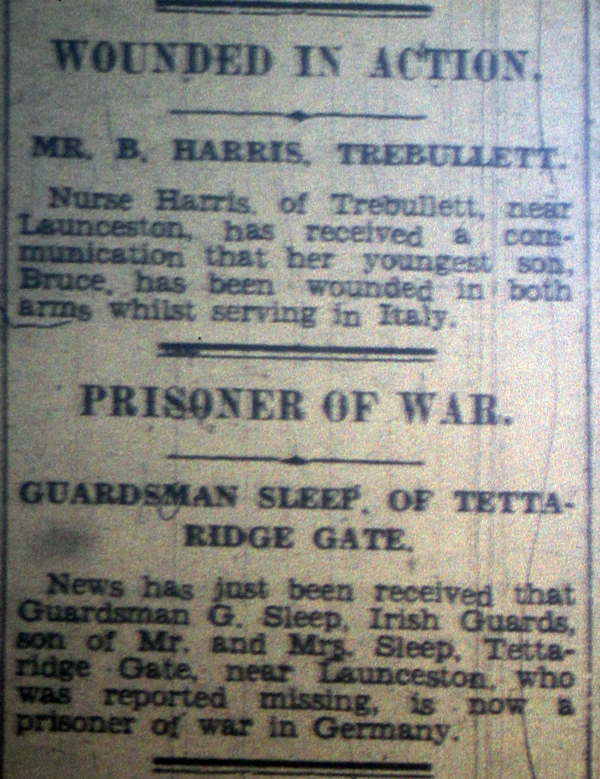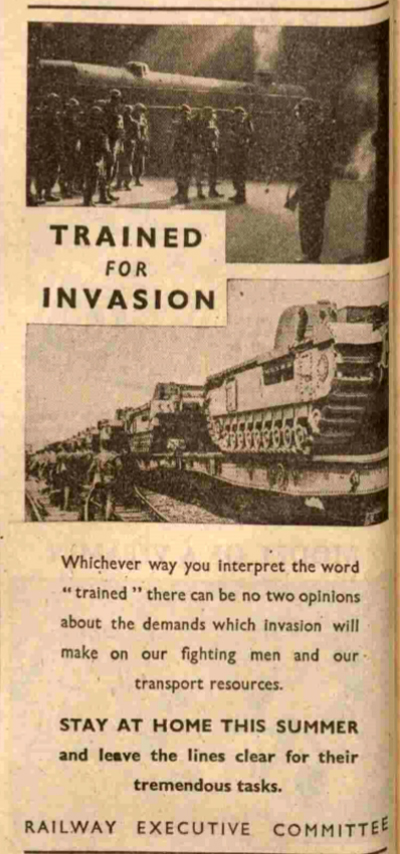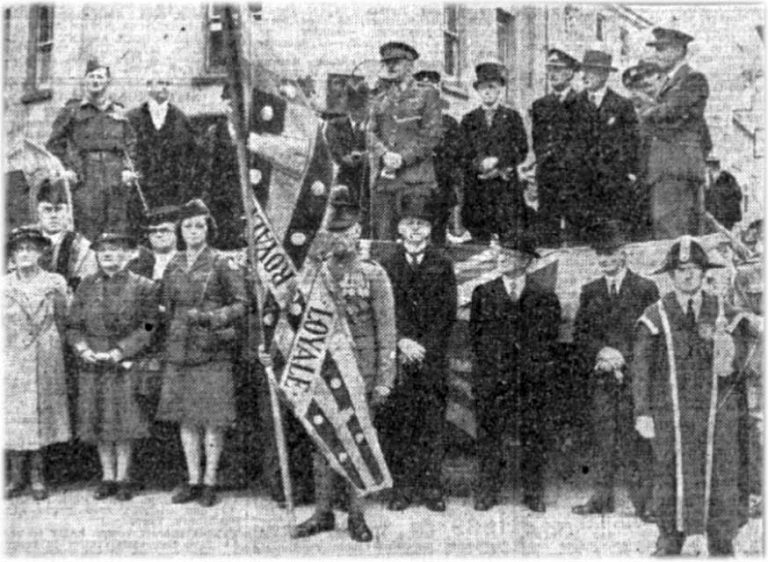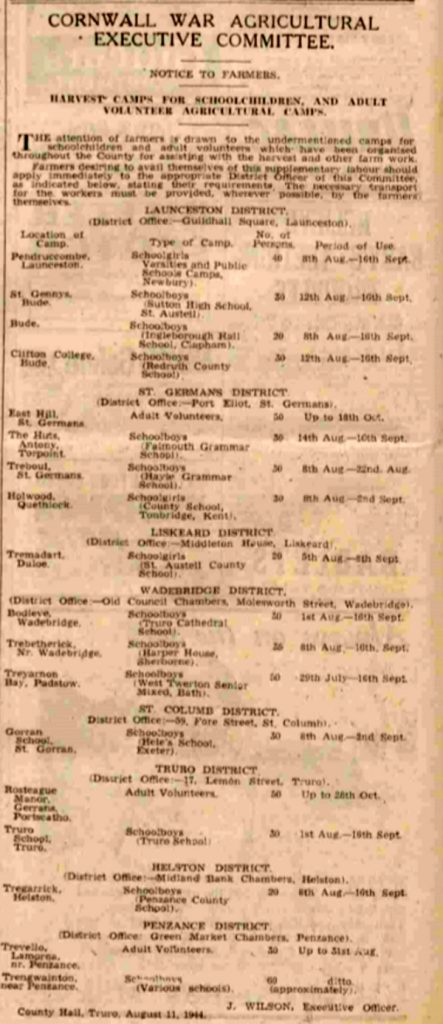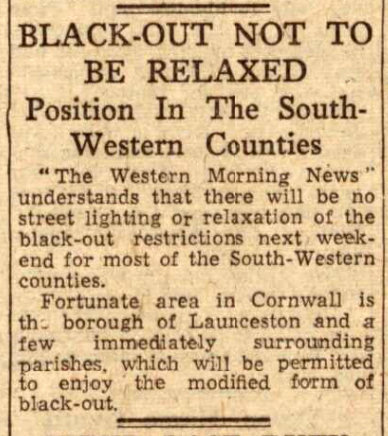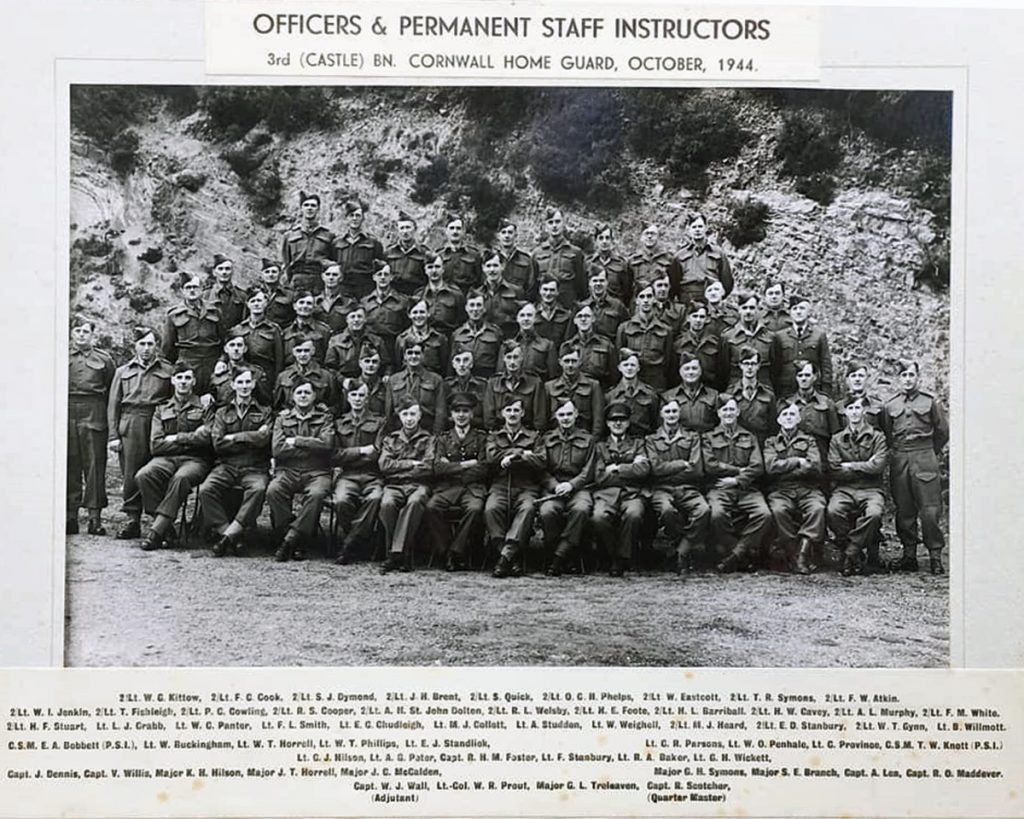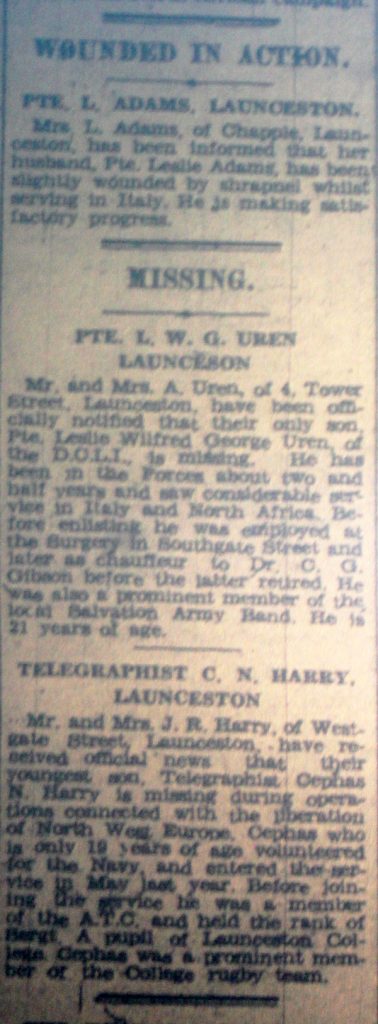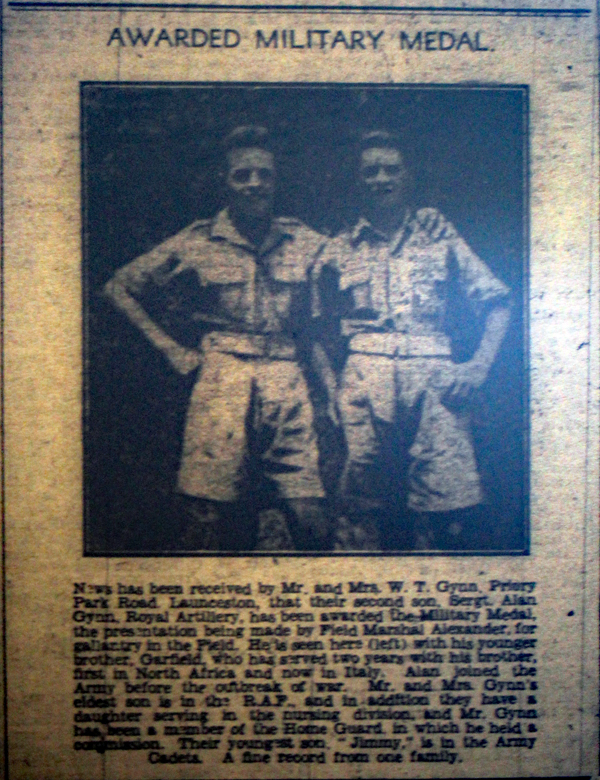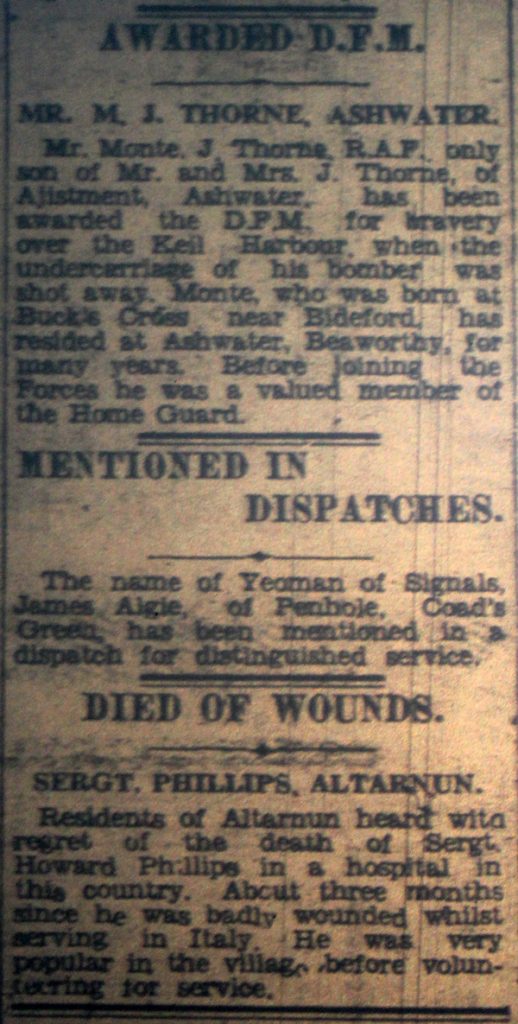.
The year started with the 1st Ukrainian Front of the Red Army entering Poland on January 4th. On the 16th, General Dwight D. Eisenhower arrived in London, returning from a week of rest and planning in Washington, D. C., and assumed command of the European Theatre by General Orders No. 4. His new title was Commanding General, U.S. Forces, European Theatre of Operations. The following day the first Battle of Monte Cassino begins when the British X Corps attacks along the Garigliano river at the western end of the German Gustav Line and on the 19th, Red Army troops push westward toward the Baltic countries.
It was announced in January that £3,437 had been raised during 1943 by the Launceston and district branch of the Duke of Gloucester’s Agriculture Red Cross Fund and transferred £3,000 to the county fund Mr W. B. Matthews, the Treasurer, stated the balance brought forward from 1942 was £313 2s. 4d.,- and the various parishes and bodies had raised the following Altarnun, £301 14s. 1d.; Boyton, £206 15s. 5d.; Broadwood, £342 7s. 4d.: Egloskerry, Tremaine, Treneglos, and Warbstow,£180 3s. 2d.; Laneast, £87 12s. 6d.; Launceston dealers. £33 5s.; Launceston butchers, £9 8s. 6d.; Launceston, St. Mary’s, £20 5s.; Launceston, St. Thomas, 16s. 6d.; Launceston, St. Stephen’s, £126 10s.: Lezant, £350; Lawhitton, £122 15s. 6d.: Lewannick, £250; North Hill, £360 15S. 4d.: North Petherwin, £305 1s. 3d.; South Petherwin, £58 15s.; St. Giles. £105; Trewen, £24 3s. 6d.; Werrington, £180 9s. There was then a balance in hand of £446 19s. sd. During 1940, 1941, and 1942 they had come very close their target of £2,000 per annum. Last year they had passed it. Mr. Walter Dennis, the chairman, congratulated all concerned.
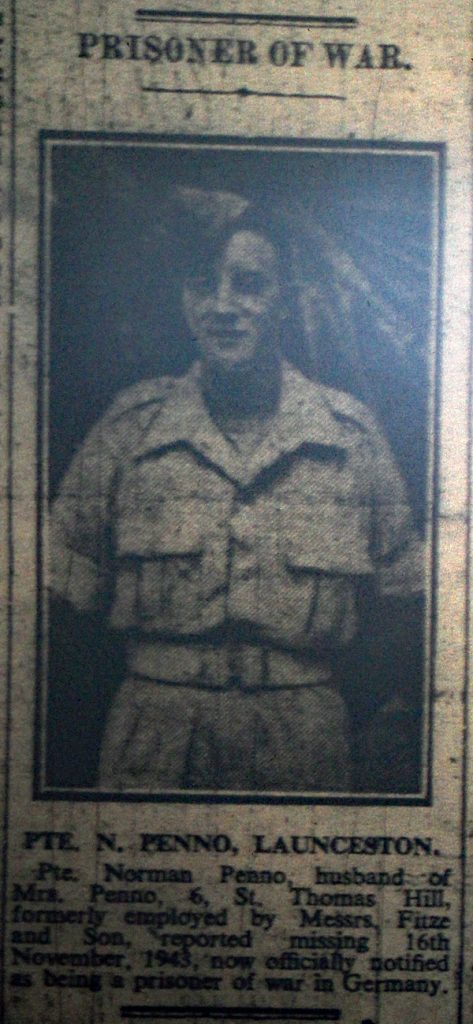
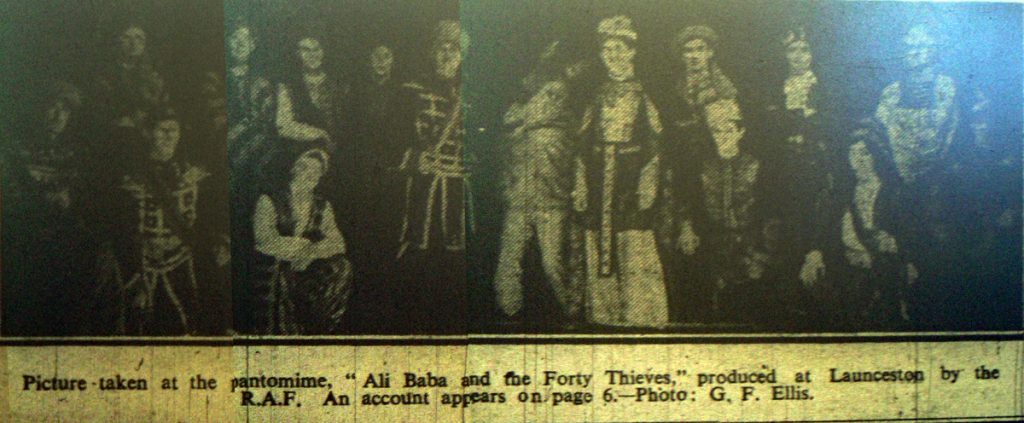
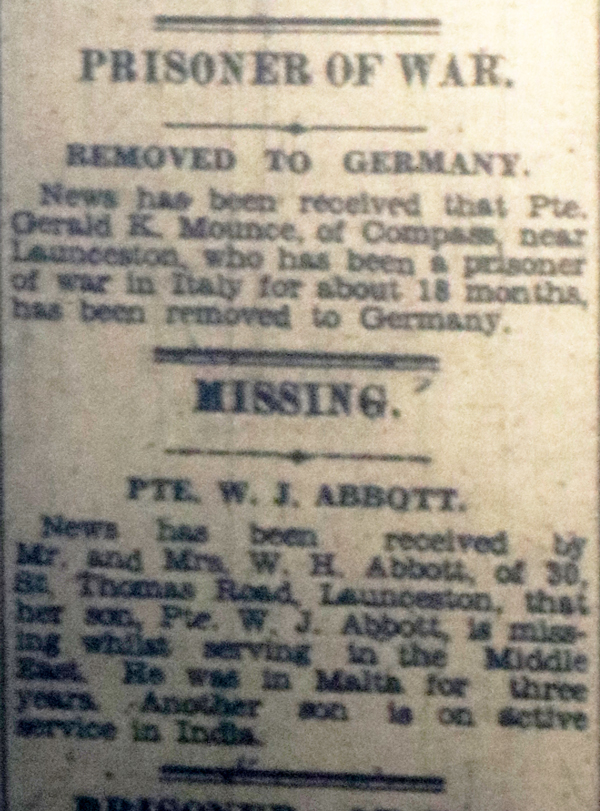
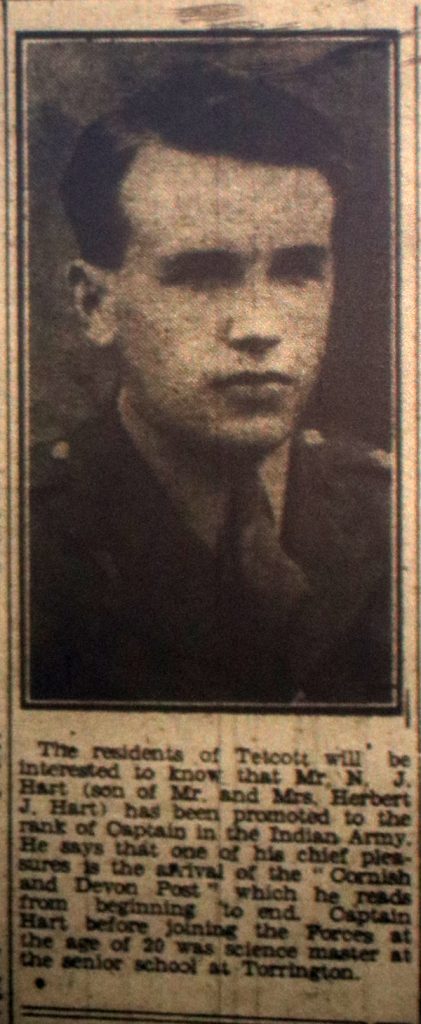
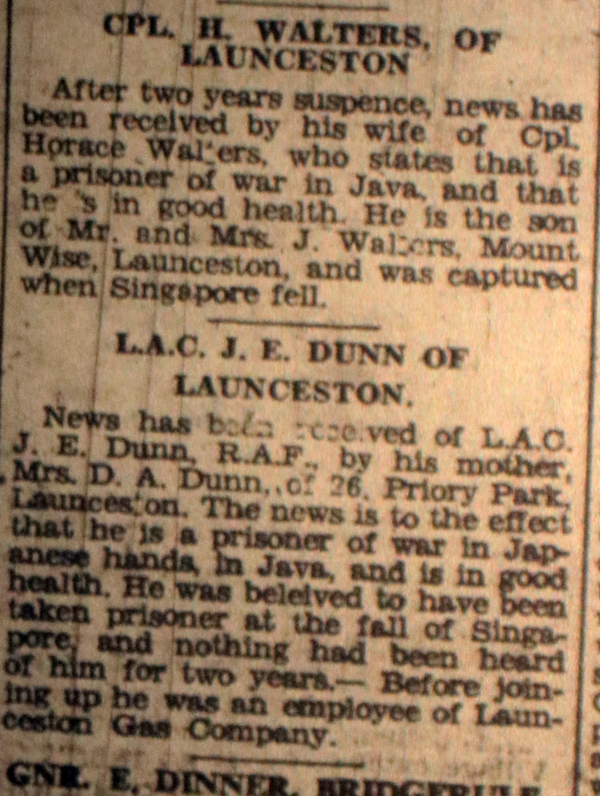
Beginning on February 19th, Leipzig, Germany is bombed for two straight nights. This marks the beginning of a “Big Week” bombing campaign against German industrial cities by Allied bombers. On March 8th, a Red Army offensive on a wide front west of the Dnieper in Ukraine forces the Germans into a major retreat. A month later the Red Army attacks in an attempt to retake all of the Crimea, the Germans retreat westward to Sevastopol. By April 16th, Soviet forces had taken Yalta with most of Crimea then being liberated. Meanwhile, the vast preparations for D-Day are going on all over southern England including Launceston.
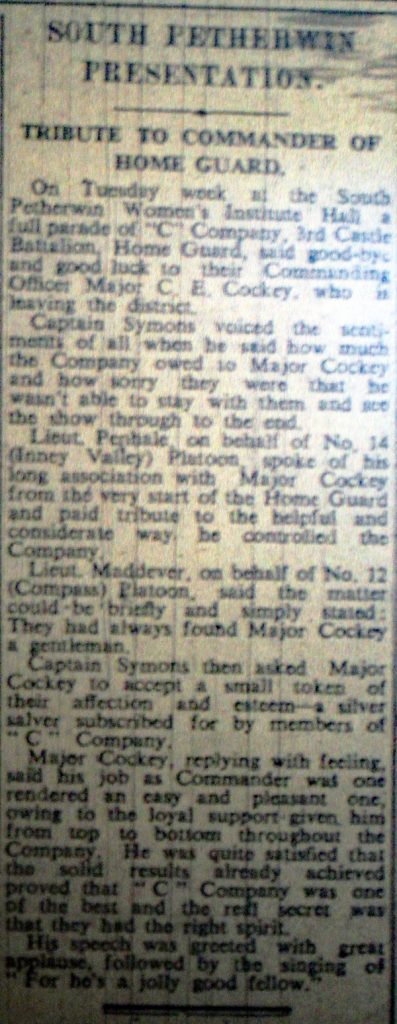
‘2 days after his 19th birthday Wilch entered US Army at Fort Thomas, Kentucky, for 13 weeks training at Camp Robinson, with ‘best friend Burton E Burfiend’.
Wilch wrote home letter in July 1943: “I’m in Company A, 335 Engineer Regiment.”He was training at Camp Young, California: July ’43 was moved to Camp Shelby, Mississippi, to join the “Fighting 69th Division” near Hattiesburg, Mi. His home was at Middletown, Ohio. After training in various camps and States, he was sent via Halifax, Nova Scotia [aboard the Mauritania] to land at Liverpool. Late November ’43, was moved by truck to Pennygillam Camp to join the 2nd Squad, 2nd. Platoon, ‘E’ Company, 115 Infantry Regiment. He trained alongside 2 other regiments in the area – 116th and 175th Regiments, 29th Division, mainly from Virginia, Maryland, Pennsylvania and New York, and also other States. The division has a history dating to the Civil War as the ‘Blue & Greys’.Names he cites in a letter home: Sgt Siti; Pte’s. George Sucharck? Clonde Weimer, William Phillips, Steve Barnelks, Perry Tomlin, Willia Reffit, Burton Burfeind, and Vincent Mornelli.The tallest man in the platoon – Perry Tomlin- named Wilch “Pee Wee”.“Long marches and hikes with full field packs on Bodmin Moors. There was a large hill they regularly ordered us to quickly climb to the top. The hill was called “Brown Willy”, very tough.”November ’43 – “England is a pretty cold damp place. Had a little snow the other day. I’m hungry for some candy or pie. We’re hungry all the time it seems. We are rationed to five ounces of candy a week, and a lot more food.”In December wrote, “Saw “The Plainsman” with Gary Cooper. Met a nice English family Christmas Eve – they wanted to know everything about us. One English lady reminded me of my grandmother. I knew them through another soldier who married one of their relations. A lot of GI’s are marrying the English girls, so they must be O.K.”The censorship officer was 1st Lt. Richard A Donnelly, from Chicago, Illinois.4th January letter: “I remember last year I went with Bill Lindsay, Frank Farmer and the rest of the boys, to the Midnight Show on New Year’s Eve.” (several photos in the book taken at Pennygillam – all with names. Yanks were permitted cameras, Brits could be shot if found with one, Germans were issued with them.) April 1st: “I was one year man in the Army on March 10th. I’m now Private First Class (PFC). In readiness for the invasion of Europe, the soldiers in Launceston and other camps were moved to a confinement area – put in quarantine from the outside world – security very high – no written letters permitted – no mention of ‘Operation Overlord”. General Charles H Gerhardt C.O. 29th Division.” P
FC Wilch and others of the regiment spent the night onboard a LCI – Landing Craft Infantry – and due to the bad weather the next day and night. Some were allowed to paddle a rubber boat around the LCI as relief and exercise – a sniper was appointed to watch for anyone attempting to land or to speak to others and to shoot before they could.
Near the end of the war in Europe Wilch was badly wounded and was sent to a Hospital near Oxford; when recovered he was partially disabled by a bad foot and was sent to a German POW camp as a guard. Several stories of his experiences around Britain and in Ireland, before he was returned to England and later repatriated to the USA.’
Below you can see the West Regional Agricultural implement dealership buildings which were built upon the old US army barracks from world war two. To the rear left, there can be seen the last three remaining Nissen huts. The Scarne Barracks housed the white GI’s. This is now the site of the Lidls supermarket. After D-Day Scarne along with Pennygillam camps were turned into POW camps.
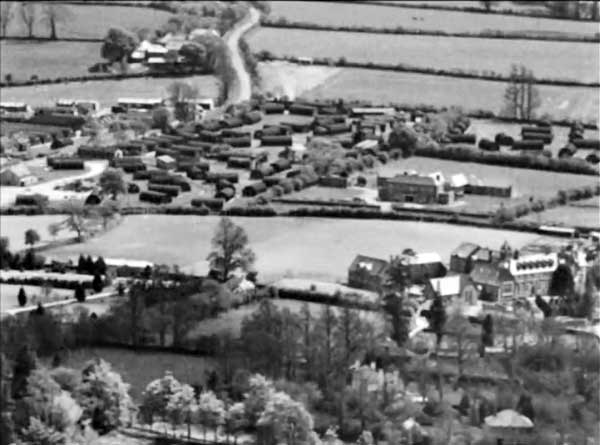
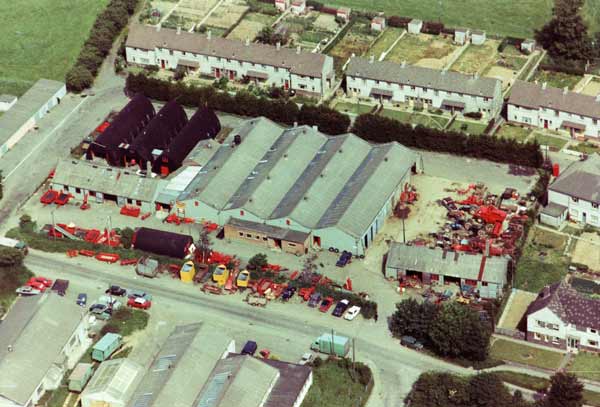
Behind Tannery Cottage at Town Mills, there were the buildings of the Tannery. Fred Davey can remember during the war that they were taken over by the Army. He can’t remember the order they were there, but the American army had a heavy goods repair depot there with black troops and white officers. There was also an RASC Supply Platoon. The troops lived away except 3 RASC Sergeants who slept in one of the outbuildings and Fred’s mother cooked for them. Stanley Tout can remember stumbling upon an ammunition dump in the caves down in the woods at the bottom of Landlake road. He recollects ‘Our gang Me, my Brother Colin, Peter and Bob Wicks with others stumbled up-on them one day. We were pounced upon by friendly G I’s guards who gave us some fun by firing their rifles at targets we placed in the field opposite.’ Another memory Stan has with his gang was an incident that if they had been caught would have landed the whole gang in serious trouble. The American navy also had a presence in the town, with their local HQ at Trenuth in Dunheved Road (USS Trenuth) and an ammunition dump in the GPO garages at the top of Race Hill. It is here that the gang decided to investigate, and although under guard, the lads with their local knowledge managed gain entry. An aladdins cave fell before their amazed eyes as they quietly studied the warehouse and their attention was drawn to the numerous machine gun ammo belts. They hatched a plan to take one of these belts as a trophy and made good their escape. Stan recalls that he and the other boys walked down Race Hill each swapping the belt draped over their necks. It was only when having taking the item home and in the cold light of day that it was realised that it wasn’t something they could just hand back, so, at the following weekend on the Saturday evening, it was decided to slip down to the cattle market to dispose of the ammo. How, they were initially not sure, but once they arrived at the now deserted market, they saw a pile of rubbish. The plan was hatched that they would burn the condemning evidence, so with rubbish neatly stoked into a pile around the ammo belt, they struck a match. The fire soon took hold with the inevitable consequence. Bullets were soon firing off in all directions and the gang leapt for their lives behind a bank. Before they could gather their thoughts at what to next do, they heard the sound of an approaching ringing of a police bell and speeding right before the lads came a black Austin police car with two constables on board. They quickly stepped out to investigate the gun shots, possibly fearing another shooting incident. However, both constables were soon ducking for their lives as bullets ricocheted all around them. The gang, realising that they would be in serious trouble if found, decided that it would be best if they made less of their presence, making their escape the only viable way, down through a bramble and stinging nettle strewn bank into Tavistock Road. Having made good their escape, they quickly made their way to their respective homes vowing to never mention the incident in fear of being sent to borstal. And this was the last time the incident was ever mentioned until some 74 years later when Stan retold the story.
Junior Red Cross Link of the National School, Launceston, having raised for the Red Cross, staged another event —a carnival on May 6th, in aid the society. The Queen” was Wendy Maybee, the 6-years-old girl who was elected by the school children. The instigator of the event was Raymond Davey, aged 13, St. Thomas, Launceston. Before the procession, the children paraded in the school playground, where they were judged Mrs Fraser and Miss M. Allen (members of the Launceston detachment) and Miss E. Peter. The prizes were presented by Mrs D. H. A. Galbraith, vice-president the North-East Cornwall Society and commandant the Launceston detachment. The target for Lifton’s parish “Salute the Soldier” Week held at the beginning of May, had been set at £5,000. There was a concert by Billy Blythe and party from Launceston, where £57 was raised. A social was organised by Mrs A. Joyner and Mr L. C. Brown. There was a whist drive at the men’s institute and a film show in Coronation Hall. On the final night a dance was held in the Coronation Hall, Mr E. Parish being M.C.. There was great cheer when the M.C. announced that the amount raised was £5,948. Of the total £3,227 6d was paid direct into the Post Office, and over £150 was raised at the entertainments. The hon. secretary (Miss M. A. Bower) and helpers, organised by Mrs. G. F. Newman, and group secretaries were congratulated on their achievement.
Also on starting on May 6th, heavy Allied bombings of the Continent begins in preparation for D-Day, and two days later D-Day for Operation Overlord was set for June 5th. Sevastopol in the Crimea is retaken by Soviet forces on May 9th. This was followed four days later with the entirety of Crimea coming under Soviet control. Many thousands of German and Romanian soldiers have been captured, but many thousands have been evacuated. Polish troops of the 2nd Polish Corps led by General Władysław Anders capture Monte Cassino. German troops in west Italy have withdrawn to the Hitler Line. On May 25th, the Allies at Anzio link up with Allies from south Italy. Though Harold Alexander wishes to trap the German Tenth Army, American Fifth Army commander Mark W. Clark orders Truscott to turn north toward Rome. The Germans in Italy form a new defensive position on the Caesar C line.
With all this happening, Launceston Town Council on May 15th, began to look ahead post-war, when they adopted a resolution empowering the Council to enter into negotiations with Mr C. H. Mathews for the purchase of a field in connection with the housing of the working classes post-war programme. Proposing the resolution, the Deputy Mayor (Mr R. Gregg) explained the Council had decided that as far as possible for the first year they would proceed with the erection of 30 houses for the working classes on a field behind Hurdon, which, he thought, was as fine site as would be found the whole county. Mr Fulford seconded and the resolution was carried unanimously. The Town Clerk, in a statement of the year’s working of the British Restaurant, said there was a gross profit, before making provision for amortization of capital expenditure, of £192 ss. 3d. The Council would agree that was very satisfactory.
Western Morning News – Wednesday 07 June 1944.
On June 4th, the Allies enter Rome, one day after the Germans declared it an open city. German troops fall back to the Trasimene Line. The following day Operation Overlord commences when more than 1,000 British bombers drop 5,000 tons of bombs on German gun batteries on the Normandy coast in preparation for D-Day. And the first Allied troops land in Normandy; paratroopers are scattered from Caen southward. On June 6th, D-Day begins with the landing of 155,000 Allied troops on the beaches of Normandy in France. The Allied soldiers quickly break through the Atlantic Wall and push inland in the largest amphibious military operation in history.
On June 12th, the East Cornwall Joint Planning Committee heard the observations of the Ministry Agriculture on certain housing sites submitted to them for their approval. The Ministry suggested consideration, should be given wherever possible to the selection of Army camps for housing sites in place of the sites already selected. The Ministry pointed out that although Army camps might have been on good agricultural land, their use as camps was such that it was doubtful if many would be suitable for agriculture again when they were evacuated. On the other hand, selected sites might be more use as agricultural land. It was undesirable children should have to pass over arterial roads to school, and the existing sites had water and sewerage. It was pointed out that if Launceston Rural Council did not do something with the existing sites private enterprise would, and the Chairman (Mr A. G. Watkins) said each authority would give careful consideration to the Ministry’s suggestion and no doubt adopt camps where suitable for housing. The Planning Officer (Mr G. C. Page) mentioned the 1940 scheme for Fowey, which had been approved by the committee, and said the Ministry had since made a survey and adjudged some of the housing land suitable for agriculture. A Fowey representative said the land which had been scheduled for building was now required by a purchaser of a plot, but the Ministry objected, and the Planning Officer said the same thing would occur with other places planned—Lostwithiel, Looe, and Launceston. He suggested they submit plans all those places to the Ministry at once. Mr Browning Lyne asked they must accept the ruling of the Ministry of Agriculture. It might be necessary to use agricultural land for housing in some places. The Planning Officer said the Ministry was very reasonable. The Chairman reported on the Plymouth conference and commended the bold and wonderful planning. He hoped Plymouth Corporation would have sufficient sense —(A Voice: And money)—and courage to go ahead with the idea, which would make Plymouth a beautiful place and an example to be followed. The Planning Officer said the first housing site had now been officially approved. It was the Lanchardlane site Liskeard for 190 houses. At the June meeting of the Launceston Town Council, the Surveyor (Mr W. K. Pickup) reported that during the quarter ending June the value of salvage disposed of was £131 3s. 2d., compared with £59 16s. 7d. the previous quarter.
Germany launches a V1 Flying Bomb attack on England on June 13th, in Hitler’s view a kind of revenge for the invasion. He believes in Germany’s victory with this “secret weapon.” The V-1 attacks will continue through June. During the 19th and 20th of June, the Battle of the Philippine Sea, nicknamed the Great Marianas Turkey Shoot by Americans, takes place. The United States Fifth Fleet wins a decisive naval battle over the Imperial Japanese Navy near the Mariana Islands. Over 200 Japanese planes are shot down while the Americans only lose 29 to enemy action. Operation Bagration is launched on June 22nd, this is a general attack by Soviet forces to clear the German forces from Belarus This results in the destruction of the German Army Group Centre, possibly the greatest defeat of the Wehrmacht during World War II. After heavy resistance Caen, France is liberated by the British troops on the left flank of the Allied advance on July 9th. On July 20th an unsuccessful assassination attempt is made on Hitler. Hitler was visiting headquarters at Rastenburg, East Prussia. Reprisals follow against the plotters and their families and even include Rommel.
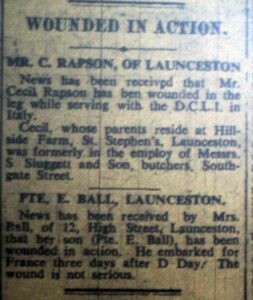
On opening of Launceston’s ‘Salute the Soldier’ week on Saturday, July 22nd, Brig. J. W. Pendlebury said things might seem to be going slowly in Normandy, but how long the Germans would be able to stand up to the situation on the Russian front he did not know, but he could make a fair guess that this would be the last annual savings campaign at any rate as far as the European war was, concerned. Paying tribute to the Army Cadet Force, Brig. Pendlebury said he had seen Hitler’s Youth Germany, and it was obvious a vast amount of money’ was spent on them, just to turn them into thugs and brutes. He also paid a tribute to the Home Guard. Mr P. G. Heppenstall (Southwestern regional Representative of the National Savings Committee) said Holsworthy up to now held the flag for the highest figure in small savings in Devon. He felt sure Launceston would top that figure, but to win the Cornish flag Launceston would have to top the much higher figure which had been set by the Isles of Scilly. An imposing procession of the various Services was watched by great crowds of people. Brig. Pendlebury took the salute outside the Guildhall. The first day of Launceston and District and Broadwood ” Salute the Soldier ” Week was carried the area about one-fifth of the way to the target of £125,000—a total £24,018 being invested on Saturday, July 22nd. The figures were announced in The, Square the following day by the treasurer (Mr J. W. P. Williams). The Mayor (Ald. G. E. Trood) appealed for a total of £150,000 to wind up the campaign in Cornwall. On the Sunday a drumhead service was held in the Coronation Park, and the band of the D.C.L.I. gave selections. In the evening the City of Plymouth Police Choir gave a concert in the Townhall when the Chief Constable of Cornwall was present. A garden party held on the 24th in St. Stephen’s Vicarage grounds was followed a concert the Townhall. By the end of the week over £127,000 had been raised and at the beginning of August, the total stood at £139,785.
Driver John Albert Duke (Royal Army Service Corps) of Launceston, was awarded the Military Medal at the beginning of September. Canadian troops capture Dieppe, France on September 1st, and the following day Allied troops enter Belgium with Brussels being liberated by the British Second Army. Lyon is liberated by French and American troops the same day. By the end of the first week of September, Antwerp, Ghent and Liège had all been liberated. Also on September 5th, the Belgian, Dutch and Luxembourgish governments in exile sign the London Customs Convention, laying the foundations for the Benelux economic union. On the 8th, Ostend is liberated by Canadian troops and Soviet troops enter Bulgaria. Here the Fatherland Front of Bulgaria overthrows the national government and declares war on Germany. Two days later Luxembourg is liberated by U.S. First Army and the first Allied troops enter Germany, entering Aachen, a city on the border.
At the September meeting of Launceston Town Council reference was made to the fact that street lighting was now in force in the borough. The Mayor (Mr G. E. Trood) said there was great gratification when the street lights went up on Saturday night, September 16th. It was the source of great joy to many people, a large number were present when the lights were switched on and expressed their pleasure, but the Press did not seem to be quite sure that they were correct in the steps they had taken. He had had telephone messages on Sunday asking whether the town was in order in having street lighting, and he had replied that as far as he knew they were. They had received a permit from the Chief Constable, and they were quite in order in resuming street lighting. One inquiry over the ‘phone was as to whether the lights were on at that moment, and he replied that they were, and they intended to keep them on until the Order was countermanded. One newspaper suggested that Launceston was a dilemma, “but,” said the Mayor, “there is no dilemma. We had the permit, and we were quite in order, in getting the lights on.” Alderman W. H. Gilbert supported the Mayor in his remark that there was no dilemma. It was published in a London paper that the lights could on again. The Town Clerk (Mr S. L. Peter) said the Order was issued which it was stated that the relaxation applied to Launceston, and provided they could obtain the permission of the Chief Constable they were in order. They obtained the exemption and had not since received any order cancelling it. If an order were received saying that the previous one had been amended, the Council would abide by it, but up to the present none had been received.
Actg. Flt. Lt. Samuel John Nancekivell, whose home was at Torquay, was awarded the D.F.C. on September 16th. He enlisted in 1940 and won his commission in 1943. He was awarded the D.F.M. in June 1943, and was entitled to wear the ribbon the 1939-43 Star. He was born in 1918 at Launceston. The official citation remarks since the award of the Distinguished Flying Medal, Flt. Lt. Nancekivell has continued to take part in operations with skill, coolness, and courage. He has proved himself a steady and reliable flight engineer, who has done very good work both in the air and on the ground.
On September 20th, Operation Market Garden, the attempted liberation of Arnhem and turning of the German flank begins, ending in failure on the 25th, when British troops pull out of Arnhem. Over 6,000 paratroopers are captured; of the British 1st Airbourne Division, just under 8,000 of the 10,005 paratroopers are declared casualties, a staggering 80% loss. Hopes of an early end to the war are now abandoned. At the beginning of October, Soviet troops enter Yugoslavia and Hungary and also launch an offensive to capture Riga, Latvia. On October 9th, the Moscow Conference (1944) begins where Churchill and Stalin discuss spheres of influence in the postwar Balkans. The Red Army and Yugoslav partisans under the command of Josip Broz Tito liberate Belgrade. The Red Army forces are also in East Prussia on October 16th and on the 25th, Romania is fully liberated by Red Army and Romanian troops.
At October meeting of Launceston Town Council held on the 16th, members expressed themselves in favour of prefabricated houses to tide over the period between the end of the war and the erection of permanent houses. The matter arose when the minute of the Housing Committee stated that the surveyor had submitted a rough lay-out plan of the site on Hurdon Road showing the possible erection of houses. Mr S. J. Fitze said he was perturbed in regard to permanent houses, as he feared it would be years before they were erected. On their return, the first thing the men on service and married wanted were homes. He wondered whether it would not be wise for the surveyor and the chairman of the Housing Committee to go to London and see the prefabricated bungalows and houses which were on view. There were two ideal sites Launceston, and these houses could be built quickly they would solve the problem. He moved that the surveyor and chairman be asked to go to London. Seconding, Mr F. Philp said they had read a lot about these houses, but much could be learnt from a visit. The Justice (Ald. H. Hoskin) said he was opposed to the erection of houses with a life of ten years only. The expense would fall on the local inhabitants, and it would bear hard on those who had purchased their own houses, particularly working men, to subsidize houses with a life of ten years. He would rather see houses erected with a life of half a century, and he saw no reason why houses of a permanent character could not be erected within two years of the end of hostilities. Ald. J. Harvey did not agree. What, he asked, would be the position for those two years after the war? Many of the men who had been fighting had now married, and on their return, they would require houses. It was up to the Council to get ready for their return. Mr J. H. Worth said prefabricated houses would cost £600 delivered on the site; for erection, sewers, etc, a total of about £750. He agreed houses were wanted but suggested that they should be erected on the Council’s site at Windmill. Footings could be put in which could later be used for the permanent houses, and sewers and roads made with that end in view. The Surveyor (Mr W. K. Pickup) agreed that the roads could be made, but he understood the footings would not be of a suitable shape to be used for permanent houses. Mr Worth thought the Council should make a move, even if it meant erecting prefabricated houses would be some time before they would be able to get the labour to build standard houses. Men were being sent to blitzed areas. The Medical Officer of Health (Dr D. H. A. Galbraith) said he would also like to see the houses, and it was agreed to support his application for a permit, and that the surveyor and chairman of the Housing Committee be asked to inspect the houses. At the same meeting, Alderman G. E. Trood accepted an invitation to be Mayor of Launceston for the second year in succession. He had also been Mayor of the borough in 1932-33. Hopes that the Mayor would soon be engaged in making arrangements for peace celebrations were expressed. The proposition was made by the Justice (Ald. H. Hoskin), seconded by Mr R. Gregg, who was later appointed Deputy Mayor, and was supported by one of the youngest councillors, Mr Henry Spencer Toy, headmaster of Launceston College.
Good Turn By Launceston Gunner by a military observer in Italy, October 1944.
While following the first British troops to enter Cesena, the engine of my car stopped suddenly. Several attempts on my part to start it failed. I had visions of finishing my journey at the wrong end of a tow rope, when a voice behind me said, “Can I help you, sir?” I looked round to see Bombardier William Smith behind me. “Indeed you can,” I replied. “In fact, you could not have arrived at a more opportune time.” In a manner which indicated that he was an expert motor mechanic, Smith, whose family lives at Tregadillett, Launceston, set to work. Ten minutes later the trouble was rectified and the engine running as perfectly as ever. My curiosity aroused by this gunner’s knowledge of engines, I asked him a few questions and discovered that before the war he had served two year’s apprenticeship in a garage. As a result of that experience, he was able to qualify as a fitter in the Army. Thus he is one of many hundreds of soldiers serving in Italy who are following their civilian occupation to the benefit of themselves and their country. Several ragged holes in his overalls prompted the question. “Were they caused by shrapnel?” “As a matter of fact they were, sir,” replied Smith. “About a month ago, I had to go up to a tank which had broken down. The tank, being on a ridge, was in full view of the enemy and under fire from his guns. One shell landed too close and I was hit in the face, arm and leg. Fortunately, the wounds were not serious.” Certainly, Bombardier Smith looked none the worse for his narrow escape, a faint scar on his face being the only visible sign of his wounds. Before the war Smith in the Territorial Army, his regiment then being the Royal Devon Yeomanry. Being an ex T.A. Yeomanry man myself, this prompted more questions, and I found Smith had taken part in two invasions within a few months of being sent abroad. The first in Sicily and the second Salerno, Italy. Comprising the two he said, “Sicily was a picnic compared with Salerno.” It was before discovering that we had both landed on almost the identical spot on the Salerno beaches, that I agreed wholeheartedly with Smith, that “Salerno was a very sticky business.”
On November 19th, a padre attached to the Royal Artillery gave the address at Launceston Brotherhood. The President of Launceston Brotherhood (Mr J. Treleaven) announced that he had received a Christmas greeting from the 3rd Survey Regiment, which for some time was billeted the town. The letter says that the Regiment spent their “best days at Launceston since they joined the Army.” Describing prefabricated houses he had seen in London, the Medical Officer of Health (Dr D. H. A. Galbraith) at the November Launceston Town Council meeting said he considered they were useless for a family. They were well equipped, but, in his opinion, would be of little use in Launceston. Mr T. P. Fulford (chairman of the Housing Committee) said the surveyor had submitted a report on these houses, and he suggested should first be considered by the Housing Committee. It was right that they should now consider the various types of houses, but as chairman of the Housing Committee, he did not like prefabricated houses and did not think they would meet their requirements. Every member of the Council, he said, was fully alive the seriousness of the housing position, and would make every endeavour to erect the best type of house suitable to the borough. The Council agreed that the surveyor’s report should be considered by the Housing Committee.
The British Home Guard is stood down on December 3rd. On December 16th, the Battle of the Bulge begins as German forces attempt a breakthrough in the Ardennes region. The main object of Hitler’s plan is the retaking of Antwerp. Bastogne, an important crossroads, is surrounded and by the 22nd, the battle for Bastogne is at its height, with Americans running low on ammunition, food and other vital supplies. The following day the skies clear over the Ardennes, permitting Allied aircraft to begin their attacks on the German offensive, the one factor that Hitler feared in his planning and on the 24th the Americans launch their counter-attack. Two days later the siege of Bastogne is broken by Patton’s Third Army tanks, and with it, the Ardennes offensive collapses into failure, along with Germany’s last hope for the war.
From the Cornish and Devon Post Dec 30 1944: Lt. Roy D Pugsley, RA. and Sgt Geoffrey Richard Stick, both of Launceston, have been granted the MBE and MM respectively, for gallant and distinguished services in Italy.
Visits: 108

